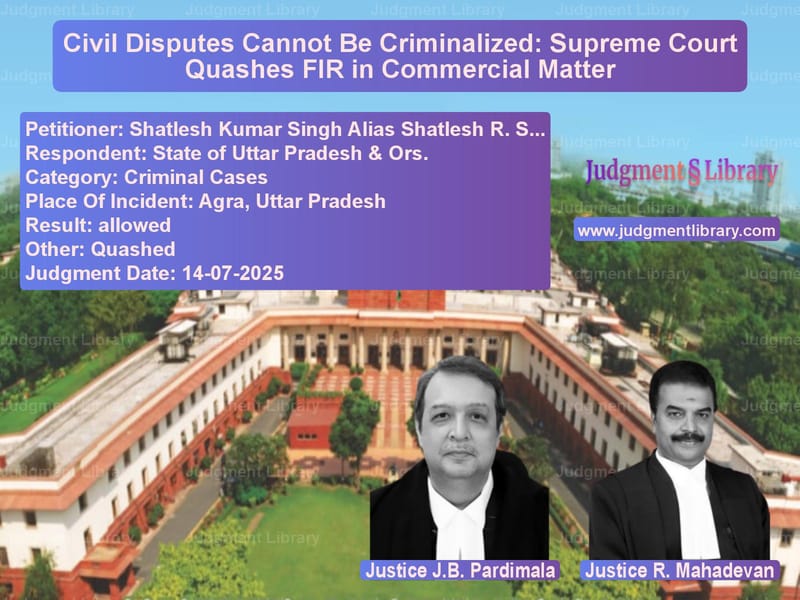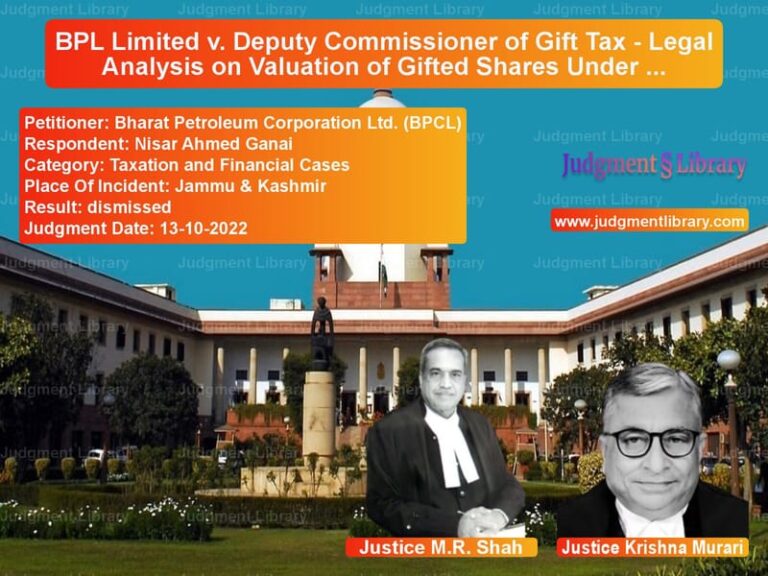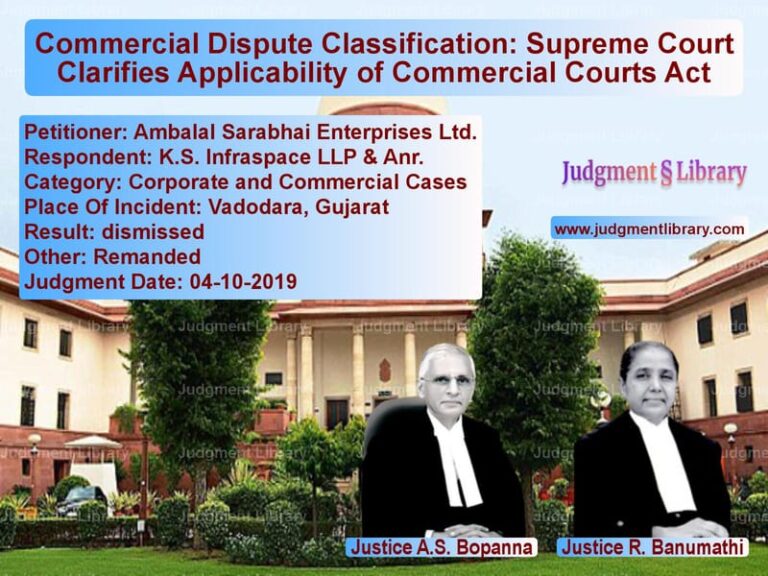Civil Disputes Cannot Be Criminalized: Supreme Court Quashes FIR in Commercial Matter
In a significant judgment that reinforces the distinction between civil disputes and criminal offenses, the Supreme Court of India recently quashed a First Information Report (FIR) that attempted to criminalize what was essentially a commercial disagreement. The case involved Shatlesh Kumar Singh, a co-founder and production head of Karma Media and Entertainment LLP, who found himself facing serious criminal charges under the newly enacted Bharatiya Nyaya Sanhita, 2023, for what the Supreme Court ultimately determined was a purely civil dispute over financial transactions between business entities.
The controversy began when the fourth respondent, operating under the name M/s Polaroid Media, filed an FIR alleging offenses under Sections 60(b), 316(2), and 318(2) of the Bharatiya Nyaya Sanhita, 2023. These sections deal with concealing design to commit offenses, criminal breach of trust, and cheating respectively. However, as the Supreme Court carefully examined the facts, it became evident that the dispute originated from an oral agreement between the parties regarding media project financing and co-production arrangements, where one party claimed money was owed by the other.
The High Court’s Controversial Order
When Shatlesh Kumar Singh approached the Allahabad High Court seeking quashing of the FIR, the court took an unusual approach. Instead of examining whether the FIR actually disclosed criminal offenses, the High Court directed the parties to undergo mediation and, more controversially, ordered the appellant to hand over a demand draft of Rs. 25,00,000 (Twenty-Five Lakhs) to the complainant as a precondition for mediation.
The High Court’s order stated: “Accordingly, the matter is referred to the Mediation Centre of this Court with the direction that after deposit of such amount by the petitioner, the Mediation Centre shall make all possible efforts to conclude the mediation and conciliation proceedings expeditiously, preferably within a period of three months.” This direction raised serious questions about the judiciary’s role in essentially facilitating recovery of alleged dues through criminal proceedings.
The Supreme Court’s Intervention
The Supreme Court, comprising Justices J.B. Pardimala and R. Mahadevan, took strong exception to the High Court’s approach. The Court began by examining whether the FIR actually disclosed commission of cognizable offenses. After analyzing the provisions of the Bharatiya Nyaya Sanhita under which the FIR was registered, the Court concluded that the essential elements of criminal offenses were completely missing from the case.
The Court pointedly asked: “We called upon the learned counsel appearing for the Respondent No.4 to make us understand in what manner the FIR discloses commission of a cognizable offence. We also called upon the learned counsel appearing for the Respondent No.4 to make us understand in what manner his client could be said to have been cheated so as to constitute the offence of cheating.”
After hearing the arguments, the Court reached a clear conclusion: “What we have been able to understand is that there is an oral agreement between the parties. The Respondent No.4 might have parted with some money in accordance with the oral agreement and it may be that the appellant – herein owes a particular amount to be paid to the Respondent No.4. However, the question is whether prima facie any offence of cheating could be said to have been committed by the appellant.”
The Essential Distinction Between Civil and Criminal Matters
The Supreme Court used this opportunity to reiterate a fundamental legal principle that lower courts often overlook. The Court emphasized: “How many times the High Courts are to be reminded that to constitute an offence of cheating, there has to be something more than prima facie on record to indicate that the intention of the accused was to cheat the complainant right from the inception. The plain reading of the FIR does not disclose any element of criminality.”
The Court further noted that the case was “squarely covered by a recent pronouncement of this Court in the case of ‘Delhi Race Club (1940) Limited vs. State of Uttar Pradesh’ reported in (2024) 10 SCC 690. In the said decision, the entire law as to what constitutes cheating and criminal breach of trust respectively has been exhaustively explained.”
Critique of the High Court’s Approach
The Supreme Court expressed strong disapproval of the High Court’s method of handling the case. The Court questioned: “However, instead of looking into the matter on its own merits, the High Court thought fit to direct the petitioner to go for mediation and that too by making payment of Rs. 25,00,000/– to the 4th respondent as a condition precedent. We fail to understand, why the High Court should undertake such exercise. The High Court may either allow the petition saying that no offence is disclosed or may reject the petition saying that no case for quashing is made out. Why should the High Court make an attempt to help the complainant to recover the amount due and payable by the accused.”
The Court made it clear that “It is for the Civil Court or Commercial Court as the case may be to look into in a suit that may be filed for recovery of money or in any other proceedings, be it under the Arbitration Act, 1996 or under the provisions of the IB Code, 2016.”
Abuse of Criminal Process
The Supreme Court highlighted a growing concerning trend where criminal proceedings are being used to settle civil disputes. The Court noted: “We also enquired with the learned counsel appearing for the Respondent No.4 whether his client has filed any civil suit or has initiated any other proceedings for recovery of the money. It appears that no civil suit has been filed for recovery of money till this date. Money cannot be recovered, more particularly, in a civil dispute between the parties by filing a First Information Report and seeking the help of the Police. This amounts to abuse of process of law.”
This observation underscores a critical legal principle – that criminal law should not be used as a debt recovery mechanism. The Court firmly stated: “We could have said many things but we refrain from observing anything further. If the Respondent No.4 has to recover a particular amount, he may file a civil suit or seek any other appropriate remedy available to him in law. He cannot be permitted to take recourse of criminal proceedings.”
Judicial Discipline and Settled Principles
The Supreme Court expressed its disturbance “by the manner in which the High Court has passed the impugned order.” The Court elaborated: “The High Court first directed the appellant to pay Rs.25,00,000/- to the Respondent No.4 and thereafter directed him to appear before the Mediation and Conciliation Centre for the purpose of settlement. That’s not what is expected of a High Court to do in a Writ Petition filed under Article 226 of the Constitution or a miscellaneous application filed under Section 482 of the Code of Criminal Procedure, 1973 for quashing of FIR or any other criminal proceedings.”
The Court reminded the High Court of its proper role: “What is expected of the High Court is to look into the averments and the allegations levelled in the FIR along with the other material on record, if any. The High Court seems to have forgotten the well-settled principles as enunciated in the decision of this Court in the ‘State of Haryana & Others vs. Bhajan Lal & Others’ Reported in 1992 Supp.(1) SCC 335.”
The Final Verdict and Its Implications
In its conclusive ruling, the Supreme Court “allowed” the appeal and “quashed” the impugned FIR. However, recognizing the legitimate civil claims that might exist, the Court clarified: “We once again clarify that it shall be open for the Respondent No.4 to avail appropriate legal remedy before the appropriate forum in accordance with law for the recovery of the alleged amount due and payable to him.”
This judgment serves as an important precedent that reinforces several crucial legal principles. First, it maintains the clear distinction between civil wrongs and criminal offenses. Second, it prevents the misuse of criminal proceedings for debt recovery. Third, it establishes boundaries for judicial intervention in quashing petitions, emphasizing that courts should examine the merits of the case rather than using mediation as an escape route from judicial decision-making.
The Supreme Court’s strong stance against the criminalization of civil disputes protects individuals and businesses from the harassment of facing criminal charges for what are essentially contractual or commercial disagreements. At the same time, it preserves the integrity of the criminal justice system by ensuring that genuine criminal cases receive proper attention without being diluted by civil matters masquerading as criminal offenses.
This judgment is particularly significant in the context of business and commercial transactions, where parties often resort to criminal complaints as pressure tactics for recovery of dues. The Supreme Court’s clear message is that civil remedies exist for civil disputes, and criminal law should not be weaponized for commercial advantage.
Petitioner Name: Shatlesh Kumar Singh Alias Shatlesh R. Singh.Respondent Name: State of Uttar Pradesh & Ors..Judgment By: Justice J.B. Pardimala, Justice R. Mahadevan.Place Of Incident: Agra, Uttar Pradesh.Judgment Date: 14-07-2025.Result: allowed.
Don’t miss out on the full details! Download the complete judgment in PDF format below and gain valuable insights instantly!
Download Judgment: shatlesh-kumar-singh-vs-state-of-uttar-prade-supreme-court-of-india-judgment-dated-14-07-2025.pdf
Directly Download Judgment: Directly download this Judgment
See all petitions in Fraud and Forgery
See all petitions in Bail and Anticipatory Bail
See all petitions in Cyber Crimes
See all petitions in Extortion and Blackmail
See all petitions in Legal Malpractice
See all petitions in Judgment by J.B. Pardiwala
See all petitions in Judgment by R. Mahadevan
See all petitions in allowed
See all petitions in Quashed
See all petitions in supreme court of India judgments July 2025
See all petitions in 2025 judgments
See all posts in Criminal Cases Category
See all allowed petitions in Criminal Cases Category
See all Dismissed petitions in Criminal Cases Category
See all partially allowed petitions in Criminal Cases Category







